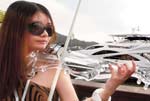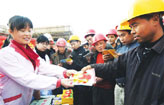View
Overstocked on disaster supplies
Updated: 2011-04-06 08:06
(China Daily)
 |
With my survival guide, sudokus and spam, I'm prepared for any emergency
A few weeks ago, I went by the grocery store and was met by a rush of people clamoring for salt. The shelves were empty, but frantic customers were still waving their money and pleading with the manager for more. Rumors had it that salt, with its iodine properties, would block any errant radiation coming from Japan.
Juggling between what would do me in first, high blood pressure from sodium consumption or nuclear fumes, I took my chances and self-medicated as prescribed by www.i-feel-burning-in-my-nether-parts-what-do-i-do-now.com and ran to the pharmacy to buy a couple of dozen boxes of potassium iodine tablets.
Back home, I put the tablets in the cupboard with the gross of N95 face masks I hoarded from the SARS outbreak, along with the now-expired doses of Tamiflu from the avian influenza (H5N1) scare, which I survived, although any further notion of getting a pet parakeet didn't.
This panic run on salt made me check our emergency supplies, where cans of spam from the Y2K alarm sat neatly in a row. Feeling a bit peckish, I opened a can, but unlike a good burgundy a decade did not seem to improve the taste. I checked my inventory: flashlight, batteries, antiseptic, radio, the Big Book of Sudoku, an extremely large-bore disposable syringe (handy if you're going into anaphylactic shock or need to inject liquid grease into a turkey) and the Ultimate Survival Guide on DVD. Someday I'll get the paperback.
Now, whether it's paranoia or just because I like buying in bulk, preparing emergency rations have a calming effect on me. Replacing the can of spam with the 2011 issue, it was with no small amount of glee that I felt fully prepared for any natural or man-made disaster. This unrealistic euphoria was probably due to the side effects of eating a can of long-expired luncheon meat, but there's really something comforting in preparing for a disaster, especially if you've had the good providence to have never experienced one.
Hollywood disaster movies are of little help on this subject. They make it so aliens, earthquakes and towering infernos keep the characters moving from one burning tanker truck to the next. With repeated watching, I may figure out where best to aim my M203 grenade launcher for maximum damage to an invading Iguanoid, but there's scant advice on how to handle the morning jitters when the instant Nescafe runs out.
Like most things, people tend to take disasters more seriously when there's a deadline. There is disagreement among scholars whether the ancient Mayans predicted December 21, 2012, as the end of the world or not. This contrasts with the universally held view that the film 2012 was a catastrophe, both critically and at the box office. In this case, 3D should have stood for "3 times the disaster".
The 18th and early 19th centuries were popular for Armageddon-like predictions. None obviously came true, but surely there were more than a few enterprising unbelievers who took advantage of the situation. Which reminds me; MREs - Meals, Ready to Eat - come not only in organic versions, but if you order a pallet of 500 units from 1-800-DOOMSDAY, they'll send you a crank-powered flashlight totally free. What a deal.
For urbanites like myself though, calamities are often thought of in terms of: "My blind date was a disaster. I thought he looked familiar. He said he was on a reality show, but it turned out to be America's Most Wanted." At worst, it's the occasional two-day electricity blackout when we resort to lukewarm water, stale bread and spam.
Disasters, for good and bad, peel away the superficiality of our lives and reveal the real necessities. In the end, it's the people not things that matter. Loved ones that you wished you could tuck safely away in a box but can't.
For all it's worth, emergency supplies are merely insurance, something that you hope to have and hope never to use. Just don't forget the can opener. Now that's an emergency.
The author is a Canadian freelance writer based in Beijing. To comment, e-mail metrobeijing@chinadaily.com.cn. The views expressed here do not necessarily reflect those of METRO.
E-paper

Han me downs
Traditional 3,000-year-old clothes are making a comeback.
Reaching out
Fast growth fuels rise in super rich
Chinese tourists spend more
Specials

Big spenders
More mainland tourists are expected to spend money on overseas travel this year.

Rise in super rich
Report cites rising property prices, gdp as key drivers of increasing number of chinese millionaires.

Reaching out
Condom makers are stepping up their presence in smaller cities to boost sales
